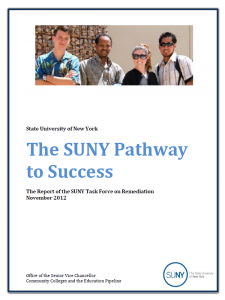As we enter the new year, we thought we’d share some of the SUNY news you may have missed during 2012.
This year, SUNY formed of the SUNY Remediation Task Force, whose job it is to determine how a collaborative effort between SUNY and K-12 school districts across New York can best prepare students for college.
Currently, SUNY community colleges spend more than $70 million per year on remediation, and 20 percent — or $93 million — of financial aid awarded to community college students goes toward remedial classes. These amounts may be significantly reduced by the K-12 education system simply reforming its approaches in getting students prepared for college.
Eliminating the need for remedial education is one of nine major initiatives outlined by Chancellor Zimpher in her 2012 State of the University Address.
“Our reliance on remediation can only be effectively addressed by an agreement on behalf of everyone who has a stake in a child’s education – from early educators to institutions of higher education and government leaders – to accept a shared responsibility for maintaining the education pipeline,” said Chancellor Zimpher. “The SUNY Task Force on Remediation brings these groups to the table and unites them in a shared commitment to make our education system stronger and our students more successful.”
The SUNY Remediation Task Force is comprised of nationally recognized researchers, representatives from the New York State Education Department, faculty, community college and K-12 leaders, and students.
Paralleling this Task Force is a SUNY-conducted study on remediation that was commissioned by the state legislature to provide a snapshot of current student preparedness in New York.
The SUNY Pathway to Success, headed by Senior Vice Chancellor for Community Colleges and the Education Pipeline Johanna Duncan-Poitier, was completed in November and submitted to the New York State Legislature in December.
Main takeaways from the study reflected in the report:
- Explore strategies with K-12 leadership to expand the use of early assessment strategies no later than the end of the eleventh grade to identify students who are not on track for college-readiness and provide them with the support needed to address weaknesses before high school graduation;
- Collaborate with K-12 to strengthen curricular alignment between high school and college expectations including support for a fourth year of college preparatory mathematics;
- Support the expansion of Smart Scholars Early College High Schools, transitional courses, summer bridge programs and other evidence-based models with a proven track record of success. (providing needed academic supports for college readiness to students prior to matriculating in college);
- Create a SUNY Pathways to Success Development and Implementation Team consisting of developmental studies faculty, academic advising and student services professionals, k-12 educators, SUNY staff and others as appropriate to:
- Develop a more consistent definition of “college-readiness” for student placement using multiple measures;
- Develop innovative strategies for campuses to expand accelerated developmental education program offerings in addition to successful existing programs, and;
- Support efforts and legislation to provide sustainable funding sources for students enrolled in Smart Scholars Early College High Schools, transitional courses, summer bridge programs and other evidence-based models. These include earlier eligibility for TAP, or other state support, as well as funding from public/corporate partnerships and philanthropies for students enrolled in these efforts.
SUNY will continue to work with its partners to ensure the education pipeline is maintained and improved. This past year has been a step forward and places effective groundwork moving forward.

